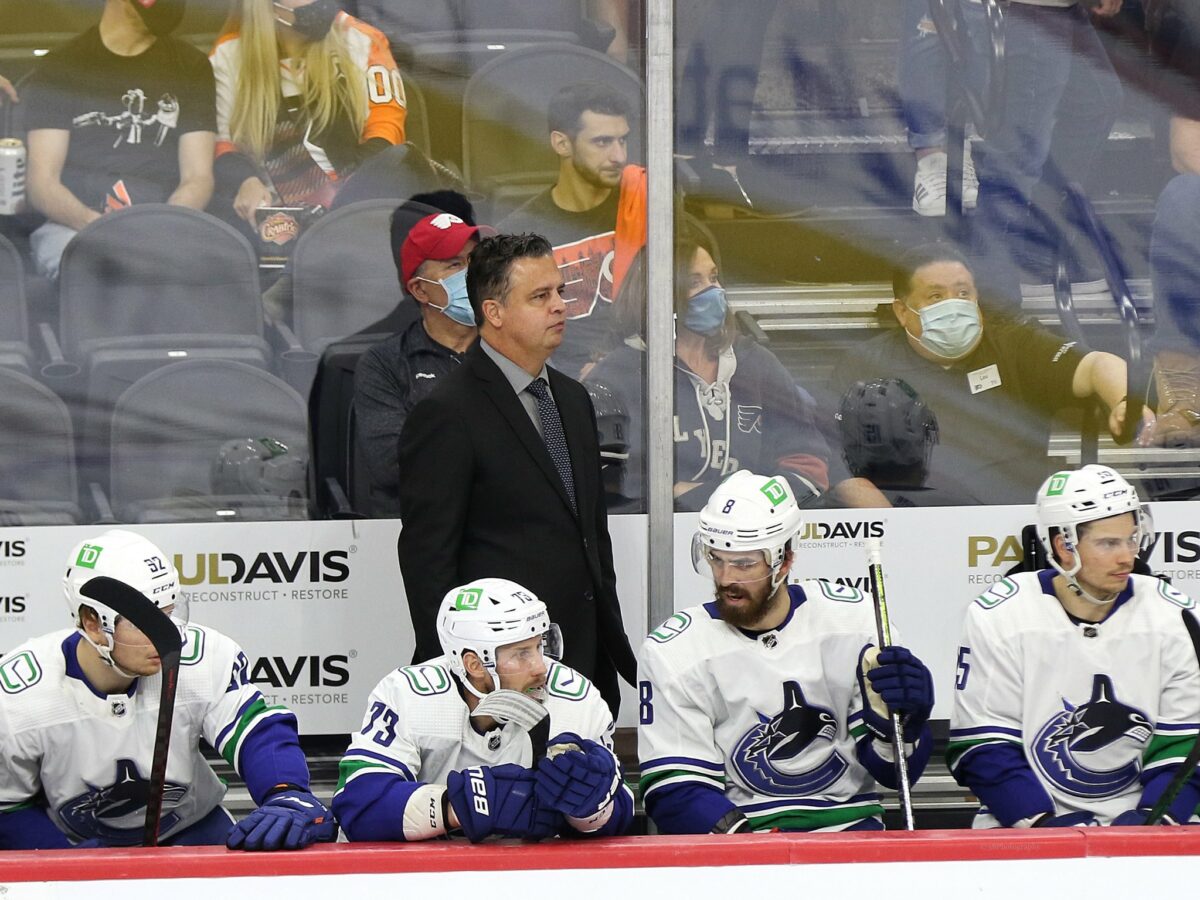Though the NHL is just over a week into the first full regular season in nearly three years, there has been no shortage of action throughout the league. Many players have gotten right back into a rhythm with their familiar teams, while others get their first taste of action with their new ones.
When players are dealt from one team to another, they often need an adjustment period to get accustomed to their new surroundings. A new city, new coaching staff, or new teammates can take some time to acclimate to, but for Conor Garland and the Vancouver Canucks, he gives them what they expected when they acquired the winger in the offseason.
Bring Secondary Scoring
To begin last year, the Canucks had a first line of Elias Pettersson centering J.T. Miller and Brock Boeser, so it made sense that Garland would be slotted alongside captain Bo Horvat to bring secondary scoring to the team. But what has been unexpected is throughout every lineup projection, they’re on the first line together with Tanner Pearson, while Pettersson and Boeser are shown on the second line. So far, Garland is off to a hot start, collecting six points through the first five games, and while he only sits with two goals so far, Garland has proven to be extremely efficient throughout his career so far.

Over the course of his early career, Garland has found a way to fill the net without needing many shots on goal. Through his first three seasons, he only averaged 2.5 shots per game. During those seasons, he had goal totals of 13, 22, and 12, respectively, all despite never playing a full 82-game season. Even if he produces at his worst pace, which was 12 goals this past season, it will put him right at 20 goals in a full 82-game season. In his best season, back in 2019-20, Garland scored 22 goals across 68 games, which would place him at 26 goals in a non-shortened season. It’s safe to say the reliability and secondary scoring Garland brings to the table is a nice benefit to the Canucks this season.
Power Play Stability
Many teams always try to have two effective power play units to create stability. Other teams will stack their top power-play unit and hope they’re able to score in the first minute and a half. The Washington Capitals are notorious for this, with lineups in the past featuring Alexander Ovechkin, Niklas Backstrom, T.J. Oshie, John Carlson and Evgeny Kuznetsov. Now, Washington has had one of the best power plays in the league over the last decade, thanks to having one of the most prolific goal scorers in NHL history. Other teams do this with high succession, but that was not the case in Vancouver last year.
Related: Canucks: Projecting Production of 2021-22 New Additions
The Canucks power play ranked 25th in the league in 2020, scoring at just 17.42% of their chances, but they now have options to choose from. The top line does feature some of their most skilled forwards, with Pettersson, Boeser, Horvat, Miller and Quinn Hughes. But now Vancouver has stability on the second unit with plenty of firepower. Garland, along with Hoglander, Pearson, and possibly Vasily Podkolzin down the line, will allow Vancouver not to overwork their top guys and spread things out. To begin the season, the Canucks are scoring on 21.4% of their power-play opportunities, and while it’s early, it’s a good start to set up for the rest of the season.
Creating Balance Throughout The Lineup
Going into the 2021-22 campaign, one of the talking points after acquiring Garland from the Arizona Coyotes was the depth provided throughout the Canucks lineup. So far, that has been on full display and allowed other players to play in different positions to give Vancouver options, creating balance throughout the lineup.
You may also like:
- Canucks Draft Misses Since 2015
- Canucks’ Top 15 Prospects for 2024-25 Season
- Daniel Sprong: What to Expect From Canucks’ Newest Signing
- Vancouver Canucks Sign Daniel Sprong to 1-Year Deal
- 5 NHL Teams That Improved in Free Agency
Against the Buffalo Sabres earlier this week, Vancouver slotted Miller on the third line with Brandon Sutter out due to long-term COVID symptoms and Jason Dickinson forced onto the fourth line. But playing with highly a touted rookie in Podkolzin, the Canucks boast three lines with scoring ability that can be rolled out night after night. The Canucks ended up losing the contest 5-2, and captain Horvat came out and addressed the team’s performance. “You’re not going to be perfect every night, but again, when you’re not perfect that night, you’ve got to find ways to get it done, and we didn’t.”
Vancouver went out and took down the Blackhawks on the road by a score of 4-1, Garland finished with a goal and an assist. Having that sort of luxury, especially over the course of an 82-game season, will have its benefits.

Yes, it is still very early on and the NHL season is not even two weeks in. Still, signing Garland to that five-year extension with an average annual value (AAV) of just $4.95 million per year, Cancuks management and fans have to be ecstatic on the return so far.